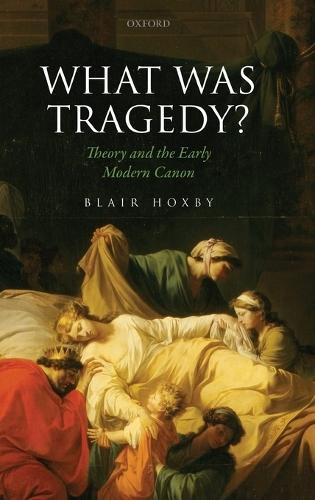Full Product Details
Author: Blair Hoxby (Associate Professor of English, Associate Professor of English, Stanford University)
Publisher: Oxford University Press
Imprint: Oxford University Press
Dimensions:
Width: 17.10cm
, Height: 2.90cm
, Length: 23.60cm
Weight: 0.738kg
ISBN: 9780198749165
ISBN 10: 0198749163
Pages: 378
Publication Date: 01 October 2015
Audience:
College/higher education
,
Undergraduate
,
Postgraduate, Research & Scholarly
Format: Hardback
Publisher's Status: Active
Availability: To order

Stock availability from the supplier is unknown. We will order it for you and ship this item to you once it is received by us.
Reviews
This is an important book, and Hoxbys call to attend to and describe what was actually performed as tragedy in the period restores vitality and variation to the canon. Ultimately, he affords us a much clearer view of the masterwork over which the period labored. Alex Eric Hernandez, Modern Philology Hoxby makes a very compelling case for attending more carefully to works that might answer to the name of tragedy produced in Europe between 1515 and 1795 ... Hoxbys book is a superb achievement, and treats us to nuanced and sensitive readings Paul A. Kottman In this densely learned book, Blair Hoxby sets himself the worthy and formidable task of scraping away the mores of German Idealists so that early modern tragedy might be read on its own terms ... it will be a valuable reference for years to come. Feisal G. Mohamed, Milton Quarterly The sweep of the book is its greatest recommendation in many respects. Hoxby's deep knowledge of music and music history, world philosophy, and theatre practice provide a worthwhile and perhaps even indispensable addition to the body of work on the nature of tragedy. For the music and theatre scholar, Hoxby's work in answering his past-tense question should prove invaluable for those seeking to answer the same question in the here and now. Michael Schwartz, Text & Presentation
The sweep of the book is its greatest recommendation in many respects. Hoxby's deep knowledge of music and music history, world philosophy, and theatre practice provide a worthwhile and perhaps even indispensable addition to the body of work on the nature of tragedy. For the music and theatre scholar, Hoxby's work in answering his past-tense question should prove invaluable for those seeking to answer the same question in the here and now. * Michael Schwartz, Text & Presentation * In this densely learned book, Blair Hoxby sets himself the worthy and formidable task of scraping away the mores of German Idealists so that early modern tragedy might be read on its own terms ... it will be a valuable reference for years to come. * Feisal G. Mohamed, Milton Quarterly * Hoxby makes a very compelling case for attending more carefully to works that might answer to the name of tragedy produced in Europe between 1515 and 1795 ... Hoxbys book is a superb achievement, and treats us to nuanced and sensitive readings * Paul A. Kottman * This is an important book, and Hoxbys call to attend to and describe what was actually performed as tragedy in the period restores vitality and variation to the canon. Ultimately, he affords us a much clearer view of the masterwork over which the period labored. * Alex Eric Hernandez, Modern Philology * Hoxby (Stanford Univ.) has written an intriguing work that attempts to establish what the genre of tragedy meant before idealists such as Schelling, Schlegel, and Hegel created the definition now accepted. * J. D. Sharpe, CHOICE * Hoxby exhibits a powerful disciplinary, linguistic, and chronological reach, and asks fundamental questions about secular and sacred drama, the Renaissance and the Enlightenment, and early modern and post-Romantic thought. For its combination of imaginative, omnivorous research and an argument that has already caused excited discussion here at RSA, the committee found this an extraordinary piece of work. * The Phyllis Goodhart Gordan Book Prize of the Renaissance Society of America Honorable Mention * One of this year's greatest scholarly achievements ... Combining literary and intellectual history, philosophy, and formal analysis, Hoxby recovers a largely lost early modern poetics of tragedy ... What Was Tragedy? has many implications not just for how we understand tragedy in our period, but also for how we conceive of early modern selfhood, how we understand the history of emotions, and how we go about the business of literary periodization. It's a major piece of scholarship. * Kevin Curran, Studies in English Literature 1500-1900 *
Author Information
Blair Hoxby is an Associate Professor of English at Stanford University. After graduating with an A. B. from Harvard University, he studied at Oxford University as a Rhodes Scholar. He then earned his Ph.D. from Yale University. Before coming to Stanford, he was an Associate Professor of English at Yale and an Associate Professor of History and Literature at Harvard. He is the author of Mammon's Music: Literature and Economics in the Age of Milton and numerous articles on Milton, literary and cultural responses to nascent capitalism, early modern theater, and theories of tragedy.



